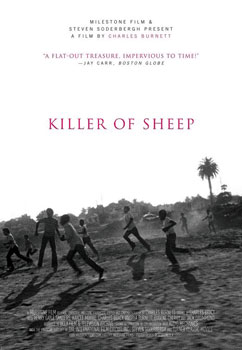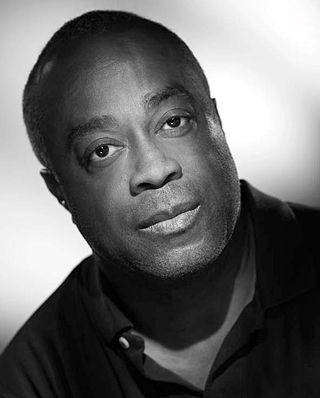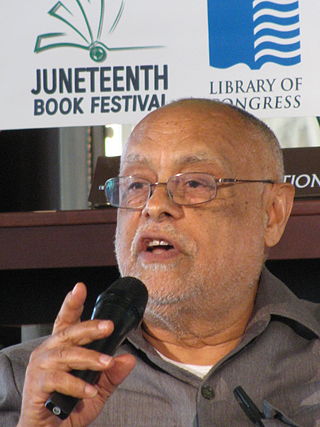Related Research Articles

Killer of Sheep is a 1978 American drama film edited, filmed, written, produced, and directed by Charles Burnett. Shot primarily in 1972 and 1973, it was originally submitted by Burnett to the UCLA School of Film in 1977 as his Master of Fine Arts thesis. It features Henry G. Sanders, Kaycee Moore, and Charles Bracy, among others, in acting roles.

Julie Ethel Dash is an American filmmaker, music video and commercial director, author, and website producer. Dash received her MFA in 1985 at the UCLA Film School and is one of the graduates and filmmakers known as the L.A. Rebellion. The L.A. Rebellion refers to the first African and African-American students who studied film at UCLA. Through their collective efforts, they sought to put an end to the prejudices of Hollywood by creating experimental and unconventional films. The main goal of these films was to create original Black stories and bring them to the main screens. After Dash had written and directed several shorts, her 1991 feature Daughters of the Dust became the first full-length film directed by an African-American woman to obtain general theatrical release in the United States. In 2004, Daughters of the Dust was named to the National Film Registry by the Library of Congress for its "cultural, historical and aesthetic significance". Stemming from the film's success, Dash also released novels of the same title in 1992 and 1999. The film was later a key inspiration for Beyoncé's 2016 album Lemonade.

Charles Burnett is an American film director, film producer, writer, editor, actor, photographer, and cinematographer. His most popular films include Killer of Sheep (1978), My Brother's Wedding (1983), To Sleep with Anger (1990), The Glass Shield (1994), and Namibia: The Struggle for Liberation (2007). He has been involved in other types of motion pictures including shorts, documentaries, and a TV series.

Haile Gerima is an Ethiopian filmmaker who lives and works in the United States. He is a leading member of the L.A. Rebellion film movement, also known as the Los Angeles School of Black Filmmakers. Since 1975, Haile has been a film professor at Howard University in Washington, D.C. He is best known for Sankofa (1993), which won two awards.
Jamaa Fanaka was an American filmmaker. He is best known for his 1979 film, Penitentiary, and was one of the leading directors of the L.A. Rebellion film movement.
Bush Mama is an American film made by Ethiopian-American director Haile Gerima, part of the L.A. Rebellion movement of political and experimental black cinema in the 1970s. It was released in 1979 though made earlier, in 1975.

Zeinabu irene Davis is an American filmmaker and professor in the Department of Communication at the University of California, San Diego. In 1985, she received her M.A in African studies at UCLA and went on to earn her M.F.A in Film and Television production in 1989. Davis is known as one of the graduates and filmmakers of the L.A. Rebellion. The L.A. Rebellion refers to the first African-American students who studied film at UCLA. Through their collective efforts, they sought to put an end to the prejudices of Hollywood by creating experimental and unconventional films. The main goal of these films was to create original Black stories and bring them to the main screens. Her works in film include short narratives, documentaries and experimental films that focus heavily on the African American female perspective.

Ben Caldwell (1945) is a Los Angeles-based arts educator and independent filmmaker.

Larry Clark is an American filmmaker, known one of the leading directors of the L.A. Rebellion. He directed the feature films Passing Through (1977) and Cutting Horse (2002). He is also a film professor in the Cinema Department at San Francisco State University.

Billy Woodberry is one of the leading directors of the L.A. Rebellion. He is best known for directing the 1984 feature film, Bless Their Little Hearts (1984), which was honored at the Berlin International Film Festival.
Vantile Emmanuel Whitfield, was an arts administrator who helped found several performing arts institutions in the United States.
Alile Sharon Larkin is an American film producer, writer and director. She is associated with the L.A. Rebellion, which is said to have "collectively imagined and created a Black cinema against the conventions of Hollywood and Blaxploitation film." Larkin is considered to be part of the second wave of these revolutionary black filmmakers, along with Julie Dash and Billy Woodberry. Larkin also co-founded the Black Filmmakers Collective.
Barbara Olivia Jones, also known as Barbarao, Barbara-O, and Barbara O., was an American actress from Ohio best known for her work in the films of the L.A. Rebellion movement of 1970s black filmmakers, starring in films by Haile Gerima and Julie Dash. She also appeared on television alongside Muhammad Ali in Freedom Road and had smaller roles in other films including Demon Seed and on television.
Barbara McCullough is a director, production manager and visual effects artist whose directorial works are associated with the Los Angeles School of Black independent filmmaking. She is best known for Water Ritual #1: An Urban Rite of Purification (1979), Shopping Bag Spirits and Freeway Fetishes: Reflections on Ritual Space (1980), Fragments (1980), and World Saxophone Quartet (1980).

Carroll Parrott Blue was an American filmmaker, director and author. Based in Houston, Texas, she was part of the L.A. Rebellion film movement. She was noted for her documentary film and interactive multimedia works, particularly for her project The Dawn at My Back: Memoir of a Black Texas Upbringing. Blue was a research professor at the University of Houston. She worked to preserve and celebrate the history of the African American community in Houston.

Shirikiana Aina is an American film director, cinematographer, producer, and writer. Shirikiana was born in Detroit, MI. She is a member of the LA Film Rebellion. She founded Mypheduh Films, Inc., a distribution company for independent Pan African Films. The company produced several features from the filmmakers of the LA Film Rebellion. She also co-founded Negod Gwad Productions, a nonprofit film company providing support to indie filmmakers. She has taught courses in script writing and film production at Howard University. She is married to film director Haile Gerima.
Melvonna "Mel" Marie Ballenger was an American director, producer, and writer who created activist short films, known for her involvement in the L.A. Rebellion film movement. She died at the age of 48 from breast cancer.

African American cinema is loosely classified as films made by, for, or about Black Americans. Historically, African American films have been made with African-American casts and marketed to African-American audiences. The production team and director were sometimes also African American. More recently, Black films featuring multicultural casts aimed at multicultural audiences have also included American Blackness as an essential aspect of the storyline.
Minor cinema is a concept that is linked to film theory and defines and challenges the current hegemony in representations; a recent overview and recognition of the term can be found in The Routledge Encyclopedia of Film Theory (2013).
Passing Through is a 1977 American film directed by Larry Clark and co-written by Clark and Ted Lange.
References
- ↑ Movie movements that defined cinema: L.A. Rebellion|Movies|Empire
- 1 2 3 "L.A. Rebellion: Creating a New Black Cinema". Los Angeles, California: UCLA School of Theater, Film & Television. Retrieved 2011-10-02.
Beginning in the late 1960s, a number of promising African and African-American students entered the UCLA School of Theater, Film and Television, recruited under a concerted initiative to be more responsive to various communities of color. From that first class through the late 1980s, and continuing well beyond their college days, these filmmakers came to represent the first sustained undertaking to forge an alternative black cinema practice in the United States. Along the way, they created fascinating, provocative and visionary films that have earned an impressive array of awards and accolades at festivals around the world, in addition to blazing new paths into the commercial market.
- 1 2 Hornaday, Ann (2007-06-03). "From L.A. Hotbed, Black Filmmakers' Creativity Flowered". Washington Post. Retrieved 2011-10-02.
In 1967, after studying electrical engineering at Los Angeles Community College, Burnett arrived at UCLA to study film. For the next 10 years, UCLA students would develop a fecund, cosmopolitan and politically engaged movement that came to be unofficially known as the Los Angeles School of Black Filmmakers.
- ↑ "The L.A. Rebellion". Film Reference. Retrieved 2011-10-02.
Armed with a knowledge of "traditional" film history now infused with an introduction to the Third Cinema movement and exposure to revolutionary films from Latin America and Africa, these filmmakers took advantage of their "outsider" positioning, reinvigorating the push for a politically driven cinema...
- 1 2 3 Patterson, John (2011-10-06). "L.A. Rebellion:Creating a New Black Cinema". L.A. Weekly. Los Angeles, California. Retrieved 2011-10-10.
This collection of the highlights of the legendary but only partially understood African-American film explosion at UCLA in the '70s and early '80s is a priceless work of excavation and restoration, and as an L.A.-specific filmic event it's unlikely to be surpassed in the near future.
- ↑ Johnson, John H., ed. (October 16, 1952). "Football Player To Pioneer In Hollywood Films". Jet. 2 (25). Chicago, Illinois: Johnson Publishing Company, Inc.: 54.
- ↑ Blaine, John; Baker, Decia, eds. (1973). "Neighborhood Arts Centers". Community Arts of Los Angeles (Report). Los Angeles Community Art Alliance. p. 32. hdl:10139/2728. OCLC 912321031.
- 1 2 Shinhoster Lamb, Yvonne (2005-01-23). "Arts Administrator, Playwright Vantile Whitfield Dies". Washington Post. Washington, DC. Archived from the original on 2019-04-28. Retrieved 2011-11-13.
He graduated with a bachelor's degree in theater and design from Howard University in 1957 and a master's degree in film production from the University of California at Los Angeles in 1967. In the years between colleges, he started community theaters.
- ↑ Norton, Chris. "Black Independent Cinema and the Influence of Neo-Realism". Images: A Journal of Film and Popular Culture. Retrieved 2011-10-02.
Most notable of these filmmakers were Charles Burnett, Billy Woodberry, Haile Gerima and Julie Dash. Drawing on their own experiences in the black community and varied political and social discourses of the time including black nationalism, the Civil Rights Movement, the Women's Movement, anti-war rhetoric and Marxist doctrine, these filmmakers sought an aesthetic and mode of representation and narration that spoke to the realities of black existence and the state of the black family under a hegemonic rule of white racism and subordination.
- 1 2 "Black Art, Black Artists (1971); Festival of Mask (1982); Varnette's World: A Study of a Young Artist (1979); Trumpetistically, Clora Bryant (1989)". UCLA Film & Television Archive. Retrieved 2011-10-02.
As the only Black faculty member in UCLA's film school, Elyseo Taylor was an influential teacher and advocate for students of color.
- 1 2 "Cinema & Media Studies professor was an internationally recognized expert on Third World Cinema". Los Angeles, California: UCLA School of Theater, Film and Television. 2010-06-10. Archived from the original on 2010-07-08. Retrieved 2011-10-03.
As a faculty member and student at TFT in the 1970s and early 1980s, Gabriel was both a colleague of and a mentor to the African-American and African student filmmakers whose work came to define the Los Angeles School of Black Filmmakers, also known as the "L.A. Rebellion." The group included such soon-to-be-celebrated artists as Charles Burnett, Larry Clark, Julie Dash, Haile Gerima, Ben Caldwell, Billy Woodberry, Alile Sharon Larkin, Jacqueline Frazier, Jamaa Fanaka and Barbara McCullough. The UCLA Film & Television Archive is currently preparing a major film exhibition scheduled for 2011 which will explore this key artistic movement.
- ↑ "What's in a Name? L.A. Rebellion | UCLA Film & Television Archive". www.cinema.ucla.edu. Retrieved 2018-09-06.
- ↑ "Doc Films". Chicago, Illinois: University of Chicago.
- ↑ Several Friends (1969) - IMDb
- ↑ Several Friends|UCLA Film & Television Archive
- 1 2 3 4 5 6 7 Notebook Sountrack Mix #11: L.A. Rebellion —— The Unity, Resistance & Love Mixtape on MUBI
- ↑ American Neorealism Now|Current|The Criterion Collection
- ↑ The Glass Shield , retrieved 2018-09-06
- ↑ "Preview: "Spirits of Rebellion" - A Documentary Film About The L.A. Rebellion Film Movement". Indiewire. Archived from the original on 2013-01-26. Retrieved 2011-10-02.
- ↑ Mos Def Returns With The Ecstatic|Pitchfork